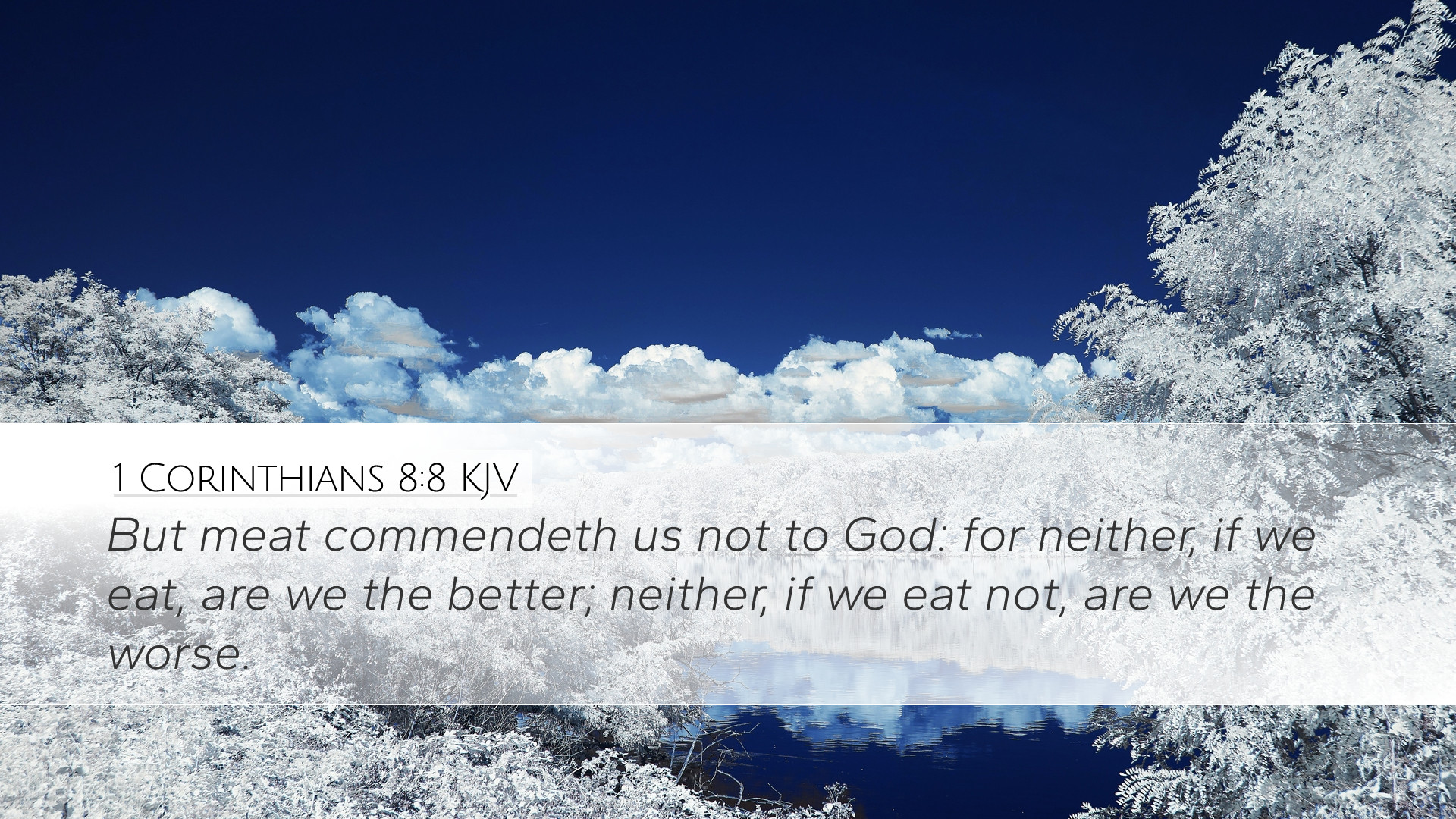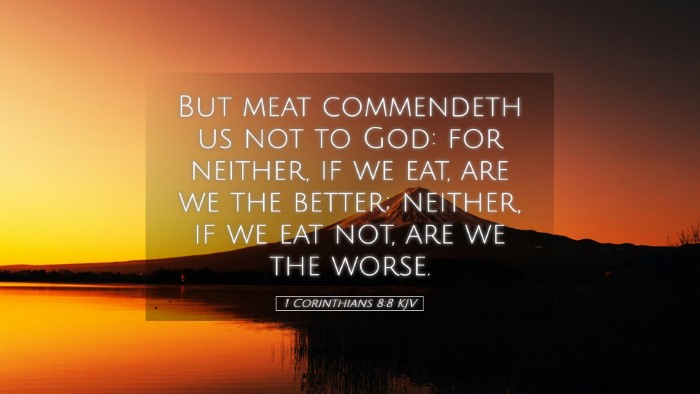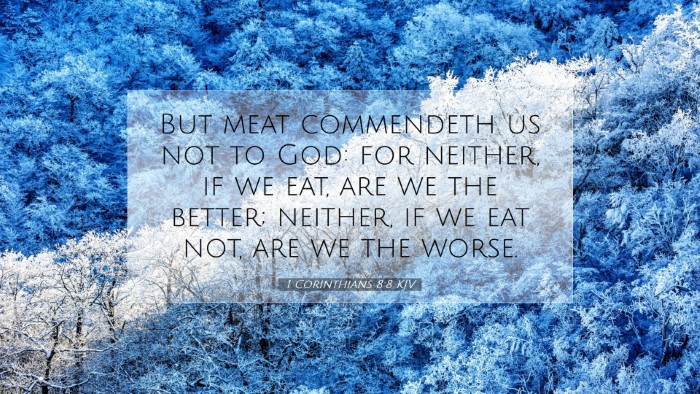Old Testament
Genesis Exodus Leviticus Numbers Deuteronomy Joshua Judges Ruth 1 Samuel 2 Samuel 1 Kings 2 Kings 1 Chronicles 2 Chronicles Ezra Nehemiah Esther Job Psalms Proverbs Ecclesiastes Song of Solomon Isaiah Jeremiah Lamentations Ezekiel Daniel Hosea Joel Amos Obadiah Jonah Micah Nahum Habakkuk Zephaniah Haggai Zechariah Malachi1 Corinthians 8:8
1 Corinthians 8:8 KJV
But meat commendeth us not to God: for neither, if we eat, are we the better; neither, if we eat not, are we the worse.
1 Corinthians 8:8 Bible Commentary
Commentary on 1 Corinthians 8:8
Verse: "But meat commendeth us not to God: for neither, if we eat, are we the better; neither, if we eat not, are we the worse."
Contextual Background
The Apostle Paul writes to the Corinthians addressing the issue of food offered to idols. This chapter explores the understanding of Christian liberty, knowledge, and love, particularly concerning the eating of meat that has been sacrificed to false deities. The church in Corinth faced challenges due to differing views among believers, particularly between the more knowledgeable members and those who were weak in their faith.
Analysis of 1 Corinthians 8:8
This verse acts as a crucial point in Paul's argument, emphasizing the insignificance of the act of eating meat when it comes to one's standing before God. Paul states that food does not affect our relationship with God; it neither brings us closer to Him nor distances us from Him.
Insights from Matthew Henry
Matthew Henry emphasizes that while food can serve various purposes, it does not enhance our connection with God. He states, "The value of our standing before God does not depend on our external practices." Henry advises that true religion goes beyond mere ritualistic observances, which, in themselves, do not bear on our spiritual condition.
- Spiritual Priorities: Henry asserts that believers must prioritize their spiritual lives over ritualistic adherence to dietary practices.
- Knowledge vs. Love: He contrasts knowledge that puffs up with love that builds up, underscoring the importance of how we treat one another in light of our freedoms.
Insights from Albert Barnes
Albert Barnes expands on the implications of Christian liberty found in this verse. He notes that while eating or abstaining from certain foods is a matter of personal choice, the critical point is that it does not determine one's acceptance with God.
- Acceptable Practice: Barnes indicates that the practice of eating meat does not commend us to God; our worth is based on faith in Christ and not on ceremonial observances.
- Mutual Consideration: He highlights the need for believers to be considerate of those whose faith may be weaker—not to cause them to stumble in their faith journey.
Insights from Adam Clarke
Adam Clarke provides a thorough theological reflection on this verse, stressing the difference between external observances and inner spiritual condition. Clarke points out that the act of eating or not eating has no intrinsic value before God.
- External Actions: Clarke notes that while food has nutritional benefits, its spiritual value is non-existent when it comes to divine acceptance.
- Christian Behavior: He urges believers to embody Christ-like behaviors over mere compliance with dietary laws, emphasizing love and unity in the body of Christ.
Theological Implications
The implications of this verse speak deeply to the nature of Christian freedom. It calls for a thoughtful and loving approach to how beliefs and practices intersect with community life among believers. The notion that food—whether eaten or abstained from—has no bearing on one's relationship with God flourishes in a context of grace.
Love Over Knowledge
Ultimately, Paul’s message prioritizes love over knowledge. While knowledge is invaluable, it must be coupled with love to guide believers in their decisions and actions towards one another.
Application for Today's Church
- Christian Liberty: Believers should understand their freedoms while being sensitive to the beliefs and convictions of others within their congregations.
- Spiritual Maturity: The church is called to nurture spiritual growth by encouraging members to act in love and consideration instead of merely exercising knowledge.
- Community Sensitivity: When deliberating on practices such as eating certain foods, it is essential to consider how these actions could affect fellow believers’ faith journeys.
Conclusion
In conclusion, 1 Corinthians 8:8 serves as a foundational verse in understanding the relationship between faith and practice. The commentary insights from Matthew Henry, Albert Barnes, and Adam Clarke collectively call believers to a higher standard—one that transcends dietary choices and revolves around love, grace, and community health.


